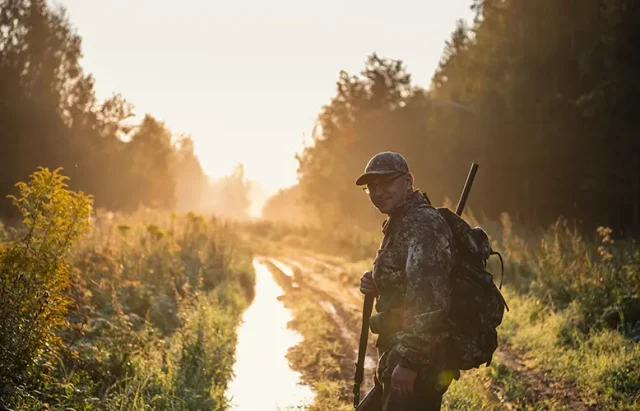
Duck hunting is an exhilarating pursuit that combines the thrill of the outdoors with the satisfaction of a successful harvest. As the sun rises over serene wetlands and you hear the quacking of ducks in the distance, you’ll understand why so many hunters are drawn to this sport. In this ultimate guide to duck hunting adventures, we’ll cover everything you need to know to get started, from the gear and equipment you’ll require to the best hunting techniques, species identification, and even delicious recipes to enjoy your harvest.
Essential Gear and Equipment
The first step in embarking on a duck-hunting adventure is to ensure you have the right gear and equipment. A quality shotgun is essential, but when is Texas duck season? Knowing the hunting season in your area is crucial to planning your trip. The Lone Star State offers diverse opportunities for duck hunting, so make sure you’re up to date with the local hunting seasons.
Firearms and ammunition: Choose the right shotgun and load it to match your intended game. A 12-gauge shotgun with a modified choke is a popular choice for duck hunting. Steel or non-toxic shot is typically required to comply with environmental regulations. Remember to check and adhere to local firearm regulations.
Decoys and calls: Duck decoys and calls are indispensable tools for luring ducks into shooting range. Invest in a variety of decoys, including mallards, pintails, and teal, and practice your calling techniques to increase your chances of success. Mastering the different calls—whether it’s quacking like a content hen or offering a lonesome greeting—will significantly improve your chances of attracting ducks.
Clothing and gear: Stay comfortable and concealed with waterproof clothing, waders, and other essential gear. Consider a neoprene wetsuit or insulated clothing to keep warm in cold, wet conditions. Layer your clothing for flexibility in changing weather. Don’t forget waterproof gloves and a hat to protect against the elements.
Boats and blinds: If you’re hunting in wetlands or marshes, a reliable boat and a well-concealed blind are crucial for setting up your hunting site effectively. Invest in a reliable layout blind or a pop-up blind that can be easily concealed with natural vegetation.
Choosing the Right Hunting Location
When is Texas duck season? The hunting season in Texas varies by region and duck species. Research the specific dates and regulations for your area, as well as any permits you might need.
Types of duck hunting environments: Texas offers diverse environments for duck hunting, including coastal marshes, lakes, and rivers. Each has its unique challenges and opportunities. For example, coastal marshes are excellent for hunting teal and redheads, while lakes and rivers may be more suitable for mallards and pintails.
Researching hunting spots: Connect with local hunters and online forums to gather information about the best hunting spots in Texas. Personal experience and advice from seasoned hunters can be invaluable. Networking with local hunters or joining a hunting club can provide you with insights into hidden gems for duck hunting.
Legal considerations and permits: Make sure you understand the hunting regulations and obtain the necessary permits. Adhering to the law is not only ethical but also crucial for conservation efforts. Check the Texas Parks and Wildlife Department website for detailed information on hunting seasons, bag limits, and permit requirements.
Preparing for the Hunt
Safety measures: Duck hunting can be thrilling, but it’s important to prioritize safety. Use a firearm safety course to become familiar with your shotgun and practice safe gun handling at all times. Always treat your firearm as if it’s loaded, and never point it at anything you don’t intend to shoot.
Weather considerations: Texas weather can be unpredictable, so it’s essential to prepare for varying conditions. Dress in layers, so you can adjust your clothing as the day progresses. Waterproof gear and clothing will keep you dry in wet conditions. Don’t forget to pack a good pair of waterproof boots for wading and traversing muddy terrain.
Setting up your hunting site: Concealment is key in duck hunting. Create a well-hidden blind, and make sure your decoys are strategically placed to attract passing ducks. Cover your blind with local vegetation to blend in with your surroundings. Remember that wind direction is a crucial factor; ducks will often approach the wind, so position your blind accordingly.
Camouflage and concealment: Blend into your surroundings with effective camouflage clothing and face paint. Ducks have keen eyesight, so any unnatural movement or color can spook them. Opt for camouflage patterns that match the environment you’ll be hunting in, whether it’s reed grass, cattails, or open water.
Duck Species and Identification
Understanding the duck species you’re targeting is vital for a successful hunt. When is Texas duck season? Different species have varying seasons and bag limits, so it’s essential to be able to identify them accurately.
Common duck species for hunting: In Texas, you’ll encounter a variety of duck species, including mallards, pintails, gadwalls, and more. Learn to identify them by their distinct characteristics. For example, mallards are known for their vibrant green heads, while pintails have long, pointed tails.
Characteristics and behaviors: Understanding the habits and behaviors of the ducks you’re hunting will help you set up your decoys and calls more effectively. Mallards, for instance, are known to be omnivorous, feeding on everything from aquatic plants to insects. Knowing their dietary preferences can help you choose the right decoy spread.
Bag limits and hunting seasons: Stay within legal limits by knowing the hunting seasons and bag limits for each species you’re pursuing. For instance, Texas may have different seasons and bag limits for teal, gadwalls, and pintails. These regulations are in place to ensure the conservation of waterfowl populations and their habitats.
Hunting Techniques and Strategies
Duck hunting is both an art and a science. Mastering these techniques and strategies can greatly enhance your success in the field.
Decoy placement and spreads: Experiment with different decoy spreads to mimic natural duck congregations. Pay attention to wind direction for realistic decoy movement. Consider using motion decoys like spinning-wing decoys to add realism to your spread.
Calling techniques: Practice your duck calls to imitate various duck sounds. Calls like quacks, feeding chuckles, and lonesome hen calls can be effective in attracting ducks. Remember, less can often be more; overcalling can spook ducks. Use calls strategically to draw them closer.
Timing and hunting patterns: Ducks are most active during dawn and dusk, which is known as the “magic hour” for hunting. Plan your hunts accordingly and be patient; sometimes, a little patience can yield the best results. Observe duck flight patterns and feeding areas to increase your chances of success.
Concealment tips: Stay hidden in your blind and avoid any sudden movements. Ducks have excellent vision and are easily spooked by movement or unnatural shapes. Choose a blind location that offers good cover and allows you to blend into your surroundings effectively.
Duck Hunting Ethics and Regulations
Ethical hunting practices and adherence to regulations are essential for the sustainability of duck populations and the environment.
Responsible hunting practices: Treat the environment and wildlife with respect. Always pick up your spent shells and any trash, and follow the principles of Leave No Trace. Consider joining a local conservation group or participating in habitat restoration projects to give back to the environment you enjoy.
Hunting laws and regulations: Familiarize yourself with local, state, and federal hunting regulations. Poaching or violating hunting laws can lead to severe penalties, including fines and loss of hunting privileges. Understand the consequences of hunting infractions in your area.
Conservation and habitat preservation: Support organizations and initiatives that work towards duck habitat conservation. By doing so, you contribute to the long-term health of the duck populations and their natural habitats. Participating in habitat improvement projects or donating to conservation organizations can make a positive impact.
Field Dressing and Cleaning Ducks
Field dressing is a critical step in preparing your harvested ducks for the table.
Proper techniques: Learn how to field dress ducks by removing feathers and entrails, and store the meat properly to maintain its freshness. Start by plucking the feathers or skinning the duck, then remove the entrails. Be sure to save the heart, liver, and gizzard for delicious recipes.
Handling game meat: Duck meat is delicious but requires proper handling to ensure its quality. Keep it cold, and consider vacuum sealing for long-term storage. Properly stored duck meat can stay fresh for several months in the freezer.
Storage and transportation: Make sure you have a plan for storing and transporting your harvested ducks. Cooler bags or coolers with ice packs are often used to keep the meat fresh. Label your meat with the date and type of duck to ensure you use it while it’s still at its best.
Safety and First Aid
While duck hunting is a thrilling adventure, it’s not without its risks. Knowing how to handle emergencies is crucial.
Common hunting-related injuries: Accidents can happen. Be aware of common hunting-related injuries and how to prevent them. Cuts, sprains, and twists are relatively common in hunting, so having a well-stocked first aid kit is essential.
First aid basics: Learn essential first aid techniques and pack a first aid kit. It’s important to be prepared for minor injuries, cuts, or sprains in the field. Your first aid kit should include bandages, antiseptic wipes, pain relievers, and any personal medications you may need.
Emergency situations and protocols: Know what to do in case of an emergency, such as severe injuries or getting lost. Carry a means of communication like a satellite phone or a locator beacon. Let someone know your hunting plans and expected return time, so they can alert authorities if you don’t return as planned.
Planning Your Duck Hunting Adventure
Before setting out on your duck hunting adventure, plan meticulously to ensure a successful and enjoyable trip.
Setting a budget: Duck hunting can be costly, with expenses including gear, permits, travel, and accommodations. Determine your budget, including any potential unexpected expenses. Allocate funds for gear maintenance and replacements, such as decoys and ammunition.
Travel and accommodation: Research travel options and accommodations near your chosen hunting location. Be sure to book in advance, especially during peak hunting seasons. Consider staying in a hunting lodge for an immersive experience or finding nearby hotels or campgrounds.
Guided hunts vs. DIY hunts: Decide whether you want to embark on a self-guided adventure or opt for a guided hunt, where experienced outfitters can provide valuable guidance. Guided hunts can be an excellent choice for beginners, as they offer access to knowledgeable guides and well-managed hunting locations.
Conclusion
In conclusion, duck hunting is a multifaceted adventure that offers both novices and seasoned hunters the opportunity to enjoy the great outdoors, test their skills, and savor the fruits of their labor at the dinner table. When planning your next duck hunting adventure, remember to respect the environment, adhere to hunting laws, and prioritize safety. By following the advice and insights presented in this guide, you’ll be well-prepared to embark on your own unforgettable duck hunting journey. Whether you’re hunting in Texas or any other duck-rich location, take pride in your role as a responsible steward of wildlife conservation and a lover of the great outdoors. Happy hunting!





